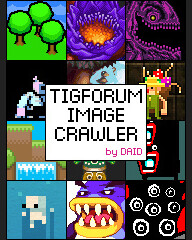Alabaster
By: Derek Yu
On: June 16th, 2009
Alabaster is a new interactive fiction game from Emily Short and various other authors that takes place in the world of Snow White. In the game you’ve been asked by the Queen to execute Snow White in the woods and bring back her heart in a box. Snow White, however, has another plan. Now that you’re out in the woods and alone with Snow White, which of the two women do you trust?
There’s a lot in this game to be interested in, starting with the game’s dark fairy tale setting and the themes that the game touches upon throughout the course of your conversation with Snow White. Secondly, there is the conversation system itself – it’s designed by Short, who laid out some of the concepts behind the system in her article about conversation in games. Alabaster also utilizes simple procedural illustration to lend a little more depth to the story without showing up the player’s imagination.
Finally, the creation of the game was rather unique in and of itself – although Emily Short wrote the introduction of the game, the conversation pieces, or “quips” were written by numerous contributors (John Cater, Rob Dubbin, Eric Eve, Elizabeth Heller, Jayzee, Kazuki Mishima, Sarah Morayati, Mark Musante, Adam Thornton, and Ziv Wities) and then tied together stylistically at the end of the development. The result is 18 different endings and over 400 quips, many of which have alternate versions, depending on the situation. The entire conversation tree is available for download, along with the game’s source code.
But is the game a success? Well, my early impressions of the game is very favorable. The story and writing are, naturally, very good. I love the idea of unraveling characters through conversation and the way you must use this information to ultimately make a decision to trust one person or another. Short’s conversation system is adequately complex, too, although the recurring problem in IF games – namely, how do I phrase what I want to say so that the interpreter understands it – is there. Conversational hints and the “CHANGE THE SUBJECT” action are very useful, but I’m still slightly resentful of them (they can be turned up or down). Still, this system is a step forward from the other (admittedly few) IF games I’ve played, and the story is well-worth following through.
TIGdb: Entry for Alabaster
-
Zenanon
-
Skofo
-
Covenant
-
Deacon Blues
-
alastair
-
Paul Eres
-
http://www.legalarcade.com Nathaniel Edwards
-
jc
-
Ezuku
-
Boy
-
JV Andres
-
Lyx
-
Lyx
-
Sparky
-
Sparky
-
Lyx
-
Flamebait
-
Anthony Flack
-
Flamebait
-
JoshRose
-
Ezuku
-
Gainsworthy
-
Ilya Chentsov
-
defacid
-
Flamebait
-
guywhoplaysgames
-
Cliftor


